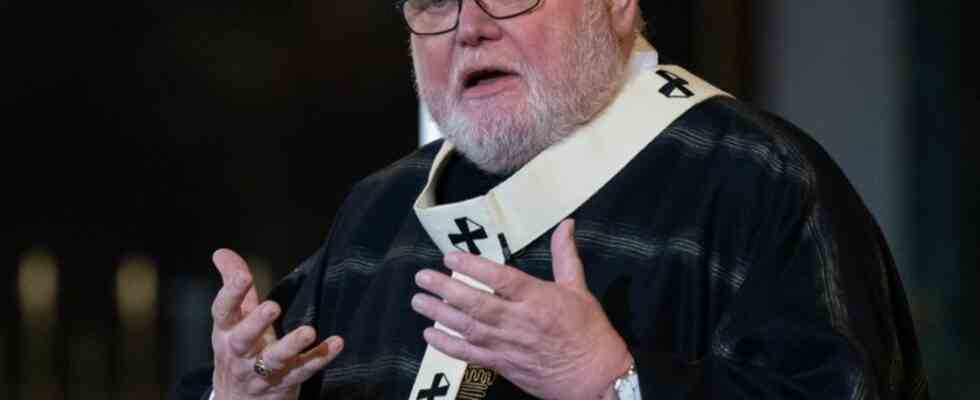One year after the publication of the Munich abuse report, which caused a stir, Archbishop Marx wants to show above all: We have understood, we have learned from mistakes.
Munich Cardinal Reinhard Marx wants to show that he has done his homework. A year after the presentation of the report on cases of sexual violence in the archdiocese of Munich and Freising, which shook the Catholic Church, the archbishop presents his diocese as a model project and reports on everything that has happened since then.
Even the very critical reform movement “We are Church” speaks of an “impressive balance sheet”: A staff unit for “pastoral care and counseling for those affected” was set up, headed by a priest who himself became a victim. There is a telephone contact and advice center, meetings with those affected – and above all, once again a clear admission of guilt.
“I will always be responsible for the suffering that this entails, and I apologize again,” says Marx. “I can’t undo what happened, but I can act differently now and in the future. And I’m doing that.”
The fact that the perspective of those affected was initially given too little consideration “was our greatest deficit. We as a church have to admit that, as an archbishop, I have to admit that self-critically”. Even a year after the report, the horror of the cases is great. “The horror remained,” says Marx. “Abuse is and remains a disaster.”
More than a hundred new clues
The report commissioned by the diocese from the Munich law firm Westpfahl Spilker Wastl (WSW) and presented a year ago assumes at least 497 victims and 235 suspected perpetrators – and from a much larger number of unreported cases, which is now possible thanks to the study more light falls.
On the anniversary of the publication, Marx calls for reporting indications of possible abuse. According to the diocese, from January 20, 2022, 57 reports were received by the independent contact persons for examining suspected cases by the end of the year, including indications of border violations that do not fall within the area of sexual abuse – and reports of already known cases . Across Bavaria, there were significantly more than 100 new indications in the Catholic dioceses, according to a survey by the German Press Agency at the turn of the year.
Opinion contained accusation against deceased pope
The study by the Munich law firm caused a stir because the former Archbishops Friedrich Wetter and Joseph Ratzinger, Pope Benedict XVI, who died on New Year’s Eve, were personally accused of misconduct in several cases – as was Cardinal Marx.
Pope Benedict XVI had to correct information that as archbishop of Munich he had not attended a meeting in which a repeat offender, a priest, who had been transferred was discussed. This made headlines around the world and is likely to have permanently damaged the memory of the Bavarian Pope. A press release from his former archdiocese about his memorial service in early January shows just how much. She dedicated an entire paragraph to the “cover-up allegations” against the emeritus pope – and also mentioned the lawsuit before the Traunstein district court.
Proceedings continue after Benedict’s death
There, a man who is said to have been abused by the same repeat offender in Garching an der Alz in Upper Bavaria, who has been transferred several times, is complaining against Ratzinger and also against the archdiocese. The civil so-called declaratory action aims to legally deal with the big question of the guilt of Catholic church leaders. After the death of the Pope Emeritus, the proceedings against him were initially suspended until a legal successor was found, but for all other defendants the deadline for comments and a statement of defense expires on January 24th.
“We do not comment on the ongoing proceedings,” says the head of the diocese, Stephanie Herrmann. Previously, Bayerischer Rundfunk and the research collective “Correctiv” had reported on a letter from a lawyer in which the diocese referred to a possible statute of limitations on the case. “The quote from a correspondence from the lawyers in December 2022 is taken out of context and is incomplete,” the archdiocese later said. “The letter does not contain a decision by the Archdiocese on the defense of the statute of limitations in the specific case.” How the Archdiocese will then officially respond to the lawsuit remains an exciting question.
“Child abuse is not a religious matter”
For years, critics have been demanding that the Catholic Church, as the “organization of the perpetrators,” should not only work through the cases in its own ranks. “Child abuse is not a religious matter,” says Gabriele Triebel, the spokeswoman on religious policy for the Greens in the Bavarian state parliament, and reiterates the call for an independent state ombudsman to whom those affected can turn.
The chairman of the Munich Advisory Board for Affected Persons, Richard Kick, also calls for this. He still thinks the cases raised by the report are the tip of the iceberg. “We are calling for another report for institutions that are not diocesan but are still church-related,” he says. “Nothing is happening there yet. I think that’s where most of the cases were – among other things in the religious orders, in the children’s homes.”
The subject of abuse must be “continuously accompanied by the church, there must be no end,” says the head of the staff unit for the prevention of sexual abuse, Christine Stermoljan. “The protection of those affected should come first, not that of the institution.”

